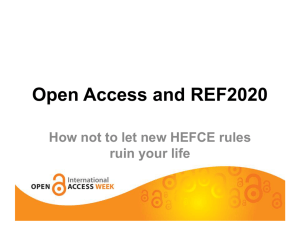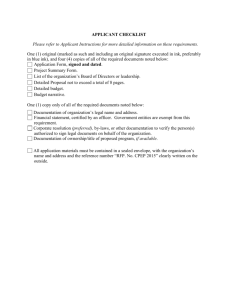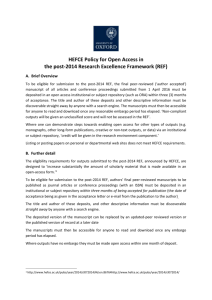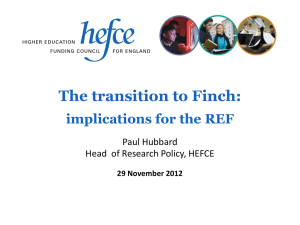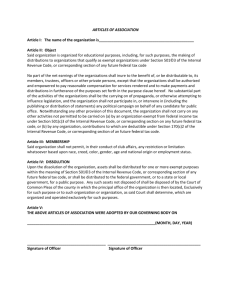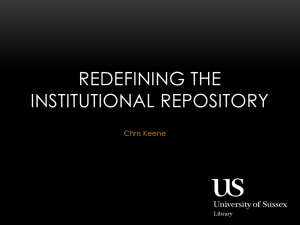Minutes of the 109th Board meeting
advertisement
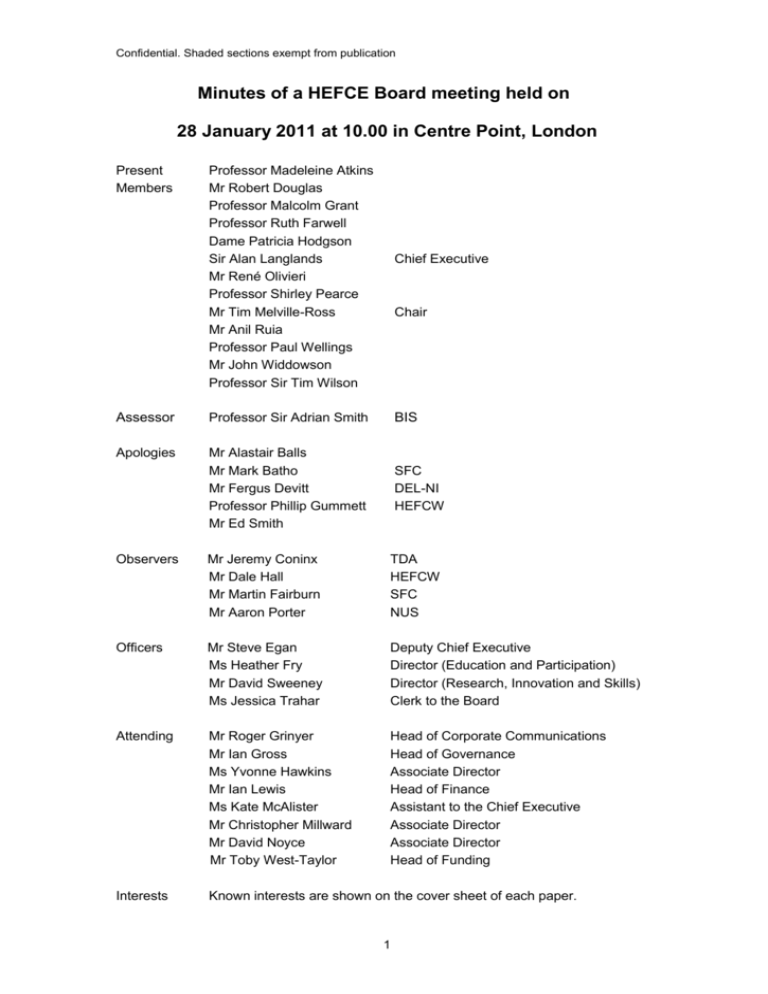
Confidential. Shaded sections exempt from publication Minutes of a HEFCE Board meeting held on 28 January 2011 at 10.00 in Centre Point, London Present Members Professor Madeleine Atkins Mr Robert Douglas Professor Malcolm Grant Professor Ruth Farwell Dame Patricia Hodgson Sir Alan Langlands Mr René Olivieri Professor Shirley Pearce Mr Tim Melville-Ross Mr Anil Ruia Professor Paul Wellings Mr John Widdowson Professor Sir Tim Wilson Chief Executive Chair Assessor Professor Sir Adrian Smith BIS Apologies Mr Alastair Balls Mr Mark Batho Mr Fergus Devitt Professor Phillip Gummett Mr Ed Smith SFC DEL-NI HEFCW Observers Mr Jeremy Coninx Mr Dale Hall Mr Martin Fairburn Mr Aaron Porter TDA HEFCW SFC NUS Officers Mr Steve Egan Ms Heather Fry Mr David Sweeney Ms Jessica Trahar Deputy Chief Executive Director (Education and Participation) Director (Research, Innovation and Skills) Clerk to the Board Attending Mr Roger Grinyer Mr Ian Gross Ms Yvonne Hawkins Mr Ian Lewis Ms Kate McAlister Mr Christopher Millward Mr David Noyce Mr Toby West-Taylor Head of Corporate Communications Head of Governance Associate Director Head of Finance Assistant to the Chief Executive Associate Director Associate Director Head of Funding Interests Known interests are shown on the cover sheet of each paper. 1 Confidential. Shaded sections exempt from publication Chair’s introduction 1. The Chair welcomed Adrian Smith to his first Board meeting as BIS Assessor. 2. The Chair congratulated Adrian Smith and Tim Wilson on their knighthoods in the New Year honours. The Chair also congratulated former Board member, Ann Tate on her CBE. Minutes 3. The Board approved the minutes of the meeting held on 9 December 2010. Starred items 4. The Board received the following papers without discussion: Operating and financial performance B11/18 Strategic Development Fund Annual Report B11/19e JACCUC Annual report B11/20 Use of delegated authority B11/21e Date of next meeting Chief Executive’s report (B11/3) 5. In presenting his report, the Chief Executive highlighted a number of recent developments to Board members: a. The Chief Executive had recently visited the University of Manchester to celebrate the achievements of Nobel Prize winners at the institution. The Chief Executive said that such achievements demonstrate the continuing strength and excellence of the UK higher education sector. b. The development of the White Paper is progressing and is currently due to be published by mid-March, in advance of the budget and the pre-election exclusion period. We expect the paper to focus on articulating a statement of principles for the future of the HE sector, and positioning students at the heart of the system. The following three areas are central to the White Paper: Access; Student experience; Research (including links to the growth strategy). The processes for setting fee levels and managing student numbers, whilst maintaining flexibility in the system, are still under discussion. The Chief Executive and Deputy Chief Executive have attended a series of meetings and workshops on the development of the White Paper. As yet, there is no firm indication regarding the future of HEFCE, however the Government have indicated their desire for a single, coherent regulatory framework, and HEFCE is continuing to work closely with other regulatory bodies, such as OFFA during the transitional period. c. The Chief Executive has recently made changes to the Chief Executive’s Group in order to broaden the membership base and to increase delegation of operational business to other parts of the Council. The group has changed name to the HEFCE Executive. A separate stream of meetings of the HEFCE Executive will be set up to ensure the continued quality of Board papers. 2 Confidential. Shaded sections exempt from publication d. An internal transition co-ordination group has also been established to oversee the transition process as it progresses. The group will be chaired by the Chief Executive and will be made up of staff from around the Council. The lead coordinator of the group is Chris Millward (Associate Director, North). e. HEFCE is continuing significant engagement with external stakeholders, particularly institutions in ensuring that transition from the point of view of institutions is understood. HEFCE is also working closely with the Student Loans Company (SLC) – the respective Chairs and Chief Executives of HEFCE and the SLC met recently and HEFCE’s Head of Assurance will be working closely with the SLC in order to synchronise the work of both organisations during the change period. 6. The Board: a. Emphasised the concern in the sector regarding uncertainty surrounding conditions for the setting of fees. A key concern is the critical timing between the intended publication of the White Paper, and guidance from OFFA for 2012-13, both of which arise at a time when institutions are preparing new access agreements for submission to OFFA. The short timescale for decisions to be made with regard to fees may result in institutions setting high fee levels in order to attempt to mitigate risks associated with the uncertain funding climate. b. Emphasised the need to have clarity on the detail of the National Scholarship Programme (NSP) as soon as possible in order for institutions to plan in line with the requirements. c. Agreed to delegate authority to the Chief Executive to agree the outcomes of submissions under the second Capital Investment Framework. 7. The Board received the report. Funding overview (B11/4) 8. The Deputy Chief Executive introduced this paper which summarised how the three funding papers that followed (B11/5; B11/6 and B11/7) fitted together and the key assumptions that underlie the recommendations on funding for 2011-12. The Deputy Chief Executive highlighted that due to the inclusion in one financial year (FY) of two academic years (AY) there are significant reductions in grant for teaching and research funding for the 2010-11 AY. We have received indicative funding figures from BIS for teaching funding for two years and research and HEIF for four years. The outlook for funding in 2012-13 remains uncertain and could be challenging depending on the outcome of the White Paper with regard to fee income and student number controls, and the demands on the teach out funding for students under the current system. 9. We are providing as much information as possible to institutions to enable them to plan effectively for the coming years. We will issue a circular letter in the week following the Board meeting to institutions, providing detailed information on the decisions taken by the Board. 3 Confidential. Shaded sections exempt from publication BIS funding announcement for 2011-12 (B11/5) 10. The Deputy Chief Executive introduced this paper which provided an analysis of the recent grant letter from BIS, dated 20 December 2010. The paper provided an allocation by academic years and thus a starting point for more detailed decisions concerning how funds should be distributed across our recurrent and non-recurrent programmes. The paper highlighted a number of key policy steers from Government as detailed in the grant letter: a. To support a smooth transition in the sector. b. A continued focus on social mobility, fair access and WP. c. Encouraging selectivity in research. d. A renewed emphasis on teaching. 11. The Deputy Chief Executive highlighted that the reduction including the removal of the one year funding for the University Modernisation Fund amounts to 11.3 per cent in cash terms for 2011-12. Reductions for research sit within a flat cash settlement for science, but with minor variations in the allocations within the science and research budget. A reduction in the 2010-11 academic year is necessary as the reduction in the 2011-12 financial year spanned two academic years. The funding recommendations protect funding for widening participation and retention in line with the policy steer in the grant letter. 12. In discussion, the Deputy Chief Executive confirmed that the decision to pro-rate reductions over four months from April to July 2011 is in line with previous practice. The decision to split the (assumed) spread of funding across financial years in the 2012-13 academic year to 55 per cent and 45 per cent (from 60 per cent and 40 per cent) in each financial year stems from grant reductions being off- set by increased graduate contributions. To maintain the 60:40 split would have led to a disproportionate reduction in funding for the 2011-12 academic year. 13. The Board: a. Noted the main policy priorities of the Secretary of State in the 2011-12 grant letter and the accompanying activities to be delivered by HEFCE. b. Noted the overall settlement values and the decrease in grant available for 2011-12, and the indicative figures for 2012-13. c. Agreed the total grant to be distributed for the 2011-12 academic year should be £6,507 million. d. Agreed that in respect of funding for the 2010-11 academic year: recurrent teaching funding should be reduced by £122 million; recurrent research funding should be reduced by £28 million; the reductions should be on a pro-rata basis; and should be implemented through reductions in grant payments for April to July 2011. Non-recurrent funding for 2011-12 (B11/6) 14. The Deputy Chief Executive introduced this paper which sought decisions on the distribution of non-recurrent grant (made up of special funding and earmarked capital) for 4 Confidential. Shaded sections exempt from publication the academic year 2011-12. The paper recommended, in line with decisions taken by the Board at its meeting in January 2010, that some reductions to capital funding made for the 2010-11 year be restored. This will include an increase in the Strategic Development Fund, support for online learning, and a small increase to the Revolving Green Fund (RGF). The remaining funding for the Teaching Capital Investment Fund and the Research Capital Investment Fund will be allocated to institutions following decisions that will be made by the Board at its March meeting. 15. The following comments were made in discussion: a. Members highlighted the uncertainty in the sector, particularly given that some of the announced funding figures remain indicative. b. Members supported an increase in funding for the RGF and requested that HEFCE officials explore whether the funding available for this activity could be increased further. 16. The Board: a. Agreed budgets for special funding of £207 million and earmarked capital of £223 million for the academic year 2011-12, and the indicative budgets for 2012-13 as set out in Annex B of the paper. b. Agreed that £107 million should be allocated over 2011-12 and 2012-13 to meet the commitments from the first Teaching Capital Investment Fund and to make the initial allocations for a second Teaching Capital Investment Fund. c. Agreed that £549 million in total should be allocated to a second Research Capital Investment Fund for the four years 2011-12 to 2014-15. d. Agreed that a proposal for further funding for the RGF should be brought for consideration by the Board at their March meeting. Recurrent funding for 2011-12 (B11/7e) 17. The Deputy Chief Executive introduced this paper which sought decisions on the distribution of the Council’s grant for 2011-12, and for adjustments to grant for 2010-11. The figures are provisional and will be confirmed at the March Board. The Deputy Chief Executive confirmed that the sector as a whole has stayed within the designated student finance budgets, however some institutions have over-recruited and some have fallen outside of the tolerance band. 18. A number of institutions are subject to funding adjustments following the outcome of data audits, and in light of over-recruitment. Recurrent funding for 2010-11 19. The Board: a. Noted the provisional adjustments to teaching grant in Annex C of the paper arising from institutions’ student numbers in 2010-11. b. Confirmed that formulaic adjustments to mainstream teaching grant should be effected as set out in institutions’ funding agreements and HEFCE 2010/22 (‘HEFCE grant adjustments 2010-11’). 5 Confidential. Shaded sections exempt from publication c. Agreed to delegate authority to the Chief Executive to vary the adjustments to grant in individual cases in the light of institutional appeals. d. Agreed that a reduction to recurrent grant for academic year 2010-11 of £150 million should be implemented as a pro rata reduction of 1.7 per cent (£27.6 million) to all allocations of recurrent research funding, and the balance of £122 million as a pro rata reduction of approximately 2.8 per cent to all elements of recurrent teaching funding with the exception of funding for widening participation and improving retention, but that moderation funding for 2010-11 should not be recalculated. Recurrent funding for 2011-12 20. The Board: a. Agreed that £30 million should be set aside for moderation funding for 2011-12. b. Agreed that the total recurrent research funding for the 2011-12 academic year should be set at £1,558 million and that total recurrent teaching funding for 2011-12 should be set at £4,339 million. Funding for teaching 21. The Board: a. Agreed that, after making provision for the adjustments to 2010-11 teaching grant summarised in paragraph 59 of the paper, each element of teaching grant, with the exception of funding for widening participation and improving retention, should be subject to a reduction of approximately 4.3 per cent. b. Agreed to set aside £5 million from within the total funding for WP and TESS to allow for changes to allocations between the March and July grant announcements arising from corrections to institutions’ underlying student data. 22. The Director (Research, Innovation and Skills) presented the proposals regarding funding for research to the Board. He highlighted that the settlement was positive given the current climate, although it will still result in a reduction to research funding in real terms. The settlement includes a reduction to funding for four of the Research councils and QR in order to support international subscriptions and increased support for Health, Physics and the Arts & Humanities. We have received advice in our grant letter to fund on the basis of internationally excellent research, and to protect funding for the next generation of researchers. This clearly implies that the Council should now move to cease counting activity at 2* level in allocating mainstream QR grant. The paper proposes that this change should be phased over two years. 23. The paper proposed a consultation with the sector, to be launched following the March Board meeting, on proposals for grant allocations to be made with effect from 2012-13, particularly for funding to support the next generation of researchers. 24. The following comments were made in discussion: a. The staged removal of the weighting for 2* activity over two years needs to be clearly communicated to the sector. 6 Confidential. Shaded sections exempt from publication b. In removing weighting for 2* activity in the future, there is a possible risk in terms of the behaviour of panels in the REF. HEFCE will attempt to mitigate this. c. Although HEFCE has not been specifically asked to increase the concentration of research funding as an end in itself, such an increase is likely to be a natural consequence of the decision to remove the weighting for 2* activity. d. It was noted that the reduction and eventual removal of the weighting for 2* activity will affect institutions of all kinds. e. The impact on the protection of grant for STEM disciplines is relative to the proposed reduction rather than protecting an absolute sum. f. The development and nurturing of new researchers is critical, and this may arise as an issue in future discussions with regard to volume and concentration of research across institutions. Funding for research 25. The Board: a. Agreed that within the total recurrent funding for research, £1,085 million should be provided for mainstream QR (including London weighting), £205 million for RDP supervision funding, £198 million for the QR charities element, £64 million for the QR business element and £6 million for national research libraries. b. Noted the advice in the grant letter that 'HEFCE should take forward funding both for research and for support for the next generation of researchers, by selectively funding on the basis of only internationally excellent research'; and the clear implication that, in implementing this by 2012/13, activity rated at 2* should no longer be counted in allocating mainstream QR grant. c. Agreed that the quality-related weighting scale within mainstream QR funding for 2*, 3* and 4* activity should be revised from 1:3:9 for 2010-11 to 0.294:3:9 for 2011-12. 26. The Deputy Chief Executive confirmed that the system for controlling student numbers will roll forward from 2010-11 to 2011-12. An additional 10,000 FTE entrant places are being made available in line with the 2011-12 grant letter from the Secretary of State. The suggested approach to the distribution of numbers is an uplift to all institutions’ student number control of 2 per cent. This approach is deemed the fairest, least burdensome approach that will result in the least turbulence for the sector. 27. The Deputy Chief Executive highlighted that in the future, student number controls will need to be different to the current system which claws back from institutions £3750 for each student that they over recruit – this is a lower figure than the possible income that institutions could gain from future fees. In light of this, institutions will not be able to under recruit after 2011-12 in order to address over-recruitment from the previous year. This means clawback will apply as teach out funding flows through the system. The circular letter to institutions will contain a general warning that institutions should not expect to benefit from over-recruitment next year in the future design of the T-funding system. 7 Confidential. Shaded sections exempt from publication 28. The need for institutions to have clarity on student numbers was reinforced by members. 29. Members noted that any future student number control will also apply to part-time students in the future (as referred to in paragraph 73c of the paper). Student numbers for 2011-12 30. The Board: a. Agreed that provisional student number control limits for 2011-12 should be calculated as described in Circular Letter 02/2011, but incorporating also an uplift of 2 per cent. b. Agreed to delegate authority to the Chief Executive to finalise student number control limits for 2011-12, including in light of any appeals submitted by institutions. Higher Education Innovation Funding 2011-2015 (B11/8e) 31. The Director (Research, Innovation and Skills) introduced this paper which provided an update on the achievements in our policy of HE innovation funding (HEIF) and presented for approval from the Board, a method for the distribution of HEFCE funding for HEIF for the next Spending review period (2011-15). The Director highlighted the widespread support for the fund from both institutions and businesses. He also emphasised that the CSR settlement for HEIF and the continued support of the Coalition for the policy demonstrates the success of the HEIF funding stream. 32. The Director highlighted that the Coalition’s policy focus for HEIF is based on efficiency, effectiveness and rewarding performance, and the proposed changes to HEIF reflect this. The changes also reflect the direction of travel for HEIF in recent years which has been consistently communicated to the sector. The proposed changes will have an inevitable impact on funding levels for some institutions, but do reflect a clear policy decision from government as highlighted in our 2011-12 grant letter. The Director highlighted that the overarching policy decision does not require consultation, however we do intend to consult on the process for implementing the changes. 33. The following points were made in discussion: a. Members welcomed the continuation of HEIF and emphasised the success of the programme. b. Members agreed that although the regional impact of funding changes was not significant, it should be monitored and flagged to BIS. A similar concern was raised over the impact on SMEs, where members also agreed that any disproportionate impact should be fed back to BIS. c. Members welcomed the recognition that the US was looking to the UK for good practice in this area. d. The tension between a formula allocation juxtaposed with a maximum cap on funding was highlighted, and further to this, the need to explain the policy clearly. 8 Confidential. Shaded sections exempt from publication 34. The Board: a. Agreed that HEFCE should consult on the proposition that higher education institutions (HEIs) that are not able to achieve a HEIF allocation of £250,000 through their performance compared with the rest of the HE sector should get no allocation at all. b. Confirmed the following additional elements to the HEIF method for 2011-15 based on the method, policy and direction of travel indicated in HEIF 4: i. The staff (capacity-building) component to be discontinued ii. Allocations to be based solely on performance, using KE income as a proxy for impact iii. The basket of KE income metrics to be drawn largely from the HE-BCI Survey (contract research, consultancy, use of facilities and equipment, regeneration funding and IP licensing), together with HESA Non-Credit Bearing CPD income and data from the Technology Strategy Board on Knowledge Transfer Partnerships iv. Income from SMEs to be double-weighted v. A maximum cap to be placed on allocations to any HEI of £2.85 million vi. The maximum decrease in allocation to any HEI to be limited to 50 per cent and the maximum increase to 50 per cent vii. Allocations to be released against an acceptable high-level institutional KE strategy and plan for use of HEIF viii. HEIs to have flexibility to use funds for any KE activities that deliver economic or social impact, including activities not included in the formula; and to vary from plans over the period, with light touch HEFCE monitoring. c. Agreed to give the Chief Executive delegated authority to agree the weightings to years of data to be used in calculating final HEIF allocations for 2011-15. d. Agreed to give the Chief Executive delegated authority to finalise the method following consultation and to approve the consequent institutional allocations. e. Noted the commitment of £113 million pa over the SR period 2011-15 from the science and research ring-fence to HEIF. f. Agreed to commit £37 million pa for 2011-15 from HEFCE funds to HEIF. g. Noted the timetable and process for making and approving allocations and institutional strategies. Leeds College of Art – transfer to the HE sector (B11/9e) 35. The Director (Education and Participation) introduced this paper which provided an analysis of the proposed submission to the Secretary of State from Leeds College of Art (LCA) for transfer into the HE sector. The paper incorporated the College’s proposed submission and an analysis of the submission against HEFCE’s broad principles for transfer into the sector. 36. The Director highlighted that LCA meets the minimum requirement for transfer to the HE sector. The final decision rests with the Secretary of State – HEFCE’s role is to 9 Confidential. Shaded sections exempt from publication provide a thorough assessment and an objective view of the evidence. The submission by LCA must be placed in the context of the likely future general volatility of the sector. Within this context, HEFCE has taken a number of extra steps to examine the case before providing advice to the Secretary of State. BIS will also receive information and advice from other organisations such as the Skills Funding Agency and the Young People’s Learning Agency. 37. Exempt minute. 38. Exempt minute. Review of JISC (B11/10) 39. The Director (Education and Participation) introduced this paper which presented the final report of the JISC Review Group. The review was commissioned by the Board in January 2010, and a Review Group chaired by Sir Alan Wilson was subsequently established, comprising members from the main UK funders of JISC and including two HEFCE Board members, Rene Olivieri and Shirley Pearce, and the Deputy Chair of JISC, David Baker. The Review was carried out by HEFCE staff due to the current restrictions on commissioning external consultants. The Director highlighted that JISC services the whole of the UK and the FE and HE sector, and during the review, significant consultation had taken place with key stakeholders and input had been received from across the HE and FE sectors. 40. The Director reported to the Board that HEFCW had considered and endorsed the review report at its meeting of 27 January, and had emphasised the need for the change process to be initiated quickly. The JISC Board will be meeting on 3 February and will be pivotal in launching changes. The paper is embargoed until 8 February pending the meeting of the JISC Board – following this date the changes will be communicated to JISC staff. 41. The following comments were made in discussion: a. The scale of change proposed is likely to be difficult and complex to manage, however members agreed that despite this, the momentum of change must be maintained. b. Members agreed that the starting point will be ensuring that a new governance system is in place quickly, and a funding model will follow. c. Members noted that the responsibility for implementation does not solely lie with JISC, although internal drive from within the organisation will be critical. 42. The Board: a. Received the report of the JISC Review. b. Noted the wide regard in which JISC is held. 10 Confidential. Shaded sections exempt from publication c. Noted the interest of JISC staff, the other UK funders of JISC, and the HE and FE sectors in this report. d. Endorsed the direction of travel of the recommendations arising and the desirability of commencing implementation soon. e. Noted that implementing the recommendations will need to be partially linked to the changes taking place in the HE and FE sectors generally and will also require collaboration with JISC’s stakeholders. f. Noted that implementing some of the recommendations will be complex and require further investigation to determine the best way forward. g. Noted the need for clear and co-ordinated communication about potential changes to JISC. h. Agreed to receive progress reports in late 2011 and periodically thereafter through the Chief Executive’s report. 43. The Board approved the following immediate actions, which are in part subject to agreement of a response to the report with the other JISC funders: a. The JISC Board should be refreshed and primarily tasked with taking forward the recommendations set out in the report. b. Steps should be taken to recruit to the position of the JISC Executive Secretary at the appropriate time, should the current post-holder choose to retire, reflecting changes to the organisation as appropriate. c. To secure resources for the development of SuperJANET6. d. To rationalise JISC’s services and projects, and review the status of JISC and its related bodies. Research Excellence Framework – impact (B11/11) 44. Exempt minute. 45. Exempt minute. 46. Exempt minute. 47. Exempt minute. Protocol for the Quality in HE Group (B11/12) 48. The Director (Education and Participation) introduced this paper which contained a draft protocol relating to the Quality in HE Group (QHEG). The QHEG is jointly ‘owned’ by Universities UK, GuildHE, HEFCE and DELNI and is chaired by Professor Phillip Jones, Vice-Chancellor of Sheffield Hallam. The proposed protocol will provide a framework for decision making by the QHEG regarding minor changes in the new quality assurance method, and for agreeing each year the subject(s) of the ‘thematic element’ of review. 11 Confidential. Shaded sections exempt from publication The aim of the protocol is to enable a more responsive review method to operate from 2012-13. 49. Since the Board paper was written, a minor change had been made to the wording of paragraph 7 of the protocol, which the Director described to members. 50. The Director reported that GuildHE has endorsed the protocol, and UUK will consider it at their next Board meeting. The Director also confirmed that there is no legal requirement to consult on the protocol. 51. The Board approved the protocol as set out in Annex A of the paper. Museums and Galleries (B11/13) 52. Anil Ruia declared an interest in this paper due to his position on the Board of the Arts Council. 53. The Director (Research, Innovation and Skills) introduced this paper which proposed a revised process for establishing eligibility for funding for university museums, galleries and collections from 2011-12. The paper put forward a number of criteria in order to judge the eligibility of such ‘university museums’ for funding. Such institutions/collections would be considered by a specially convened panel (including Board membership) which would make decisions on eligibility for funding. 54. The Board: a. Approved the process for establishing eligibility for funding for 2011-12. b. Approved the proposed eligibility criteria. c. Agreed that the Chief Executive acting under delegated authority should make individual allocations based on the outcomes of the review of eligibility. Revised scheme of delegated decision making (B11/14) 55. The Deputy Chief Executive introduced this paper which set out a revised scheme of delegation, aimed at ensuring that the current delegated decision making process is strengthened and improved in its presentation and robustness. The Deputy Chief Executive noted that in future elements of the ‘use of delegated authority’ Board paper would be reported through the Chief Executive’s report and the institutional risk paper. It was also noted that instances of referral to the Charity Commission are likely to be rare but may require immediate action when they do occur. 56. The Audit Committee has also considered the paper and is satisfied with the proposed progress. 57. The Board: a. Agreed the revised scheme of decision making, as detailed in Annex A of the paper. 12 Confidential. Shaded sections exempt from publication b. Agreed to delegate to the Chief Executive in consultation with the Chair, decisions as to when it is appropriate to ask the Charity Commission to consider the need to exercise its powers. Institutional risk update (B11/15e) 58. The Deputy Chief Executive introduced this paper, giving an updated assessment of institutional risk. He highlighted that the position was unchanged since the last Board meeting with no additional HEIs deemed as at higher risk. It is anticipated that the number of institutions at higher risk will remain the same for the next year, however the composition of those institutions may change as institutions move in and out of the risk categories. The number of institutions forecast to be at higher risk is forecast to remain the same. 59. HEFCE has now received all actual financial results from institutions but will not have a complete understanding of the forecast position until April, by which time all institutions will have submitted their forecasts. A report will be made to the Board once the forecasts have been analysed. The financial results for the previous year suggest that the sector returned a 3.3 per cent surplus overall, with HEIs actively cutting their cost base in response to the changing financial situation. 60. The Deputy Chief Executive highlighted the forthcoming report by the NAO on the financial health of the sector – this will be the subject of a public accounts committee (PAC) hearing on 30 March 2011, at which the Chief Executive will be examined. The report is due to be published shortly before the PAC hearing. 61. The work of HEFCE in encouraging institutions to be undertaking scenario planning and being realistic in their forecasting was highlighted. A significant level of dialogue is undertaken by Regional Consultants and Associate Directors with all institutions on a daily basis. The financial results from the sector demonstrate that they are responding realistically and prudently to the financial situation. 62. It was highlighted that some banks were now defining and treating HEIs as midsize commercial enterprises. In addition, there have been changes to the style of covenants which could trigger an earlier risk warning for banks. The Deputy Chief Executive reported that he is in discussion with the main banks regarding risk definitions and clarifying the position on this between HEFCE and the banks. HEFCE will highlight this point to the NAO in the context of their report. 63. This paper is exempt from publication because it contains commercially confidential information. 64. The Board received the report. Annual report on HEFCE’s Equality Scheme (B11/16) 65. The Deputy Chief Executive introduced this paper which provided the annual statutory update to the Board on HEFCE’s Equality Scheme. There have been small improvements to a number of areas but key issues still remain in the representation of 13 Confidential. Shaded sections exempt from publication BME, female and disabled staff at senior levels; the disclosure of disability, and the representation of men in HE. 66. The following comments were made in discussion: a. In designating faith on campus as a discussion issue, the definition of this topic must be clearly articulated. There should also be a clear distinction between the work being undertaken by UUK, and the focus of the Board in this area. b. The continued diversity of staff by ethnicity will be impacted on by the UK Border Agency’s restrictions on overseas visas and the report should reference this in future. This issue is also highlighted in the HE Workforce Report. 67. The Board: a. Agreed that the following two issues should be discussed further throughout 2011: i. Faith on campus (subject to a clear definition). ii. Ethnicity and degree attainment. Strategic advisory committee report (B11/17) 68. The Teaching Quality and Student Experience (TQSE) strategic advisory committee had met since the last Board meeting and had submitted a report on the outcome of the meeting. 69. The Board received the report. Date of next meeting 70. The Board noted the date of its forthcoming planning event and next meeting on 2-3 March 2011, location to be confirmed with members shortly. The meeting ended at 12.50. 14
